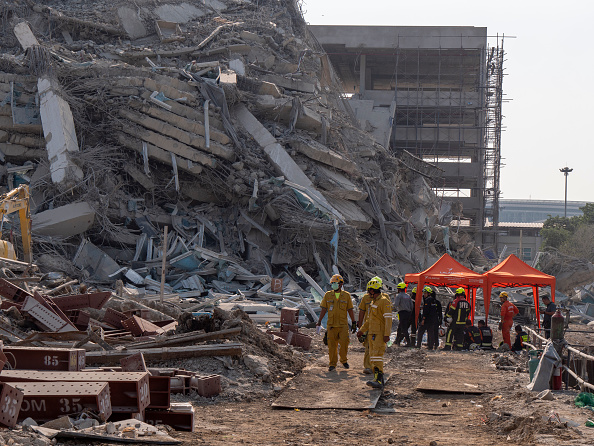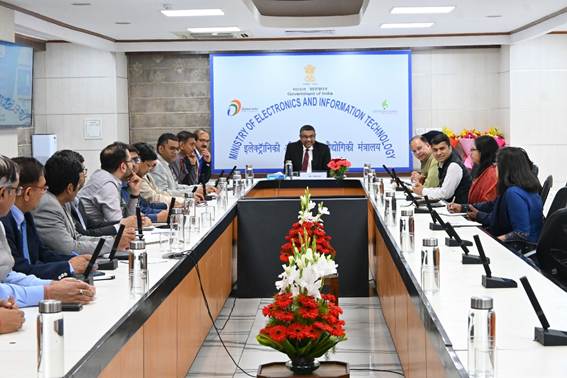Myanmar’s junta said on Wednesday its troops fired warning shots at a Chinese Red Cross aid convoy, underlining the challenge of delivering relief amid a civil war as aid groups called for better access to help survivors of a devastating earthquake.
The military has struggled to run Myanmar following its coup against the elected civilian government of Nobel laureate Aung San Suu Kyi in 2021, reducing the economy and basic services including healthcare to tatters after civil war broke out.
Junta spokesperson Zaw Min Tun said the Chinese Red Cross had not informed authorities it was in a conflict zone on Tuesday night, and a security team fired shots in the air after the convoy, which included local vehicles, failed to stop.
A Chinese foreign ministry spokesperson said the aid team and supplies were safe, and called on all parties in Myanmar to ensure the safety of rescuers.
“It’s necessary to keep transportation routes for relief efforts open and unobstructed,” Guo Jiakun told a press conference.
The firing came as the death toll from Friday’s 7.7-magnitude quake rose to 2,886, with 4,639 injured, Myanmar state media said.
The rural parts of hard-hit Sagaing region were mostly under the control of armed resistance groups fighting the military government, the International Crisis Group said.
“They will be among the most challenging for aid agencies to reach, given regime restrictions, a complex configuration of local administrations and control by armed resistance groups, and the persistent conflict,” it added in a statement.
Even before the quake, the ICG said, information had been hard to gather from such areas, because of a junta blackout of internet and mobile phone networks as part of the conflict.
“Soldiers are everywhere in the town,” a man who travelled to Sagaing told Reuters. “They are there for security, not for rescue. They check every vehicle.”
New York-based Human Rights Watch urged the junta to allow unfettered access for humanitarian aid and lift curbs impeding aid agencies, saying donors should channel aid through independent groups rather than only junta authorities.
“Myanmar’s junta cannot be trusted to respond to a disaster of this scale,” Bryony Lau, deputy Asia director at Human Rights Watch, said in a report.
“Concerned governments and international agencies need to press the junta to allow full and immediate access to survivors, wherever they are.”
The military has dismissed as misinformation accusations that it committed widespread atrocities as it fought against a multi-pronged rebellion that followed the coup.
Rebels have accused the military of conducting airstrikes even after the quake and on Tuesday a major rebel alliance declared a unilateral ceasefire to help relief efforts.
MILLIONS AFFECTED
The United Nations said there were more than 28 million people in the six regions affected by the quake, and it had $12 million in emergency funding for food, shelter, water, sanitation, mental health support and other services.
“The situation remains critical, with disrupted communications and road access hampering response efforts, particularly in Sagaing,” the United Nations Office for Project Services (UNOPS) said.
Australia announced a further A$6.5 million ($4.1 million) in humanitarian support for Myanmar, supplied “through thoroughly vetted international and local partners”.
In a statement on Wednesday, Foreign Minister Penny Wong said, “We take proactive steps to ensure our assistance does not legitimise the military regime in Myanmar.”
A woman in Mandalay, near the quake epicentre, told Reuters that authorities were building a stage for this month’s Thingyan water festival, though many people were homeless, with bodies left under collapsed buildings.
The military council has rejected requests from international journalists to cover the quake devastation, citing the lack of water, electricity and hotels.
In neighbouring Thailand, the death toll from the quake rose to 22 on Wednesday, with hundreds of buildings damaged.
A search for survivors in the rubble of a skyscraper under construction in the capital, Bangkok, entered its fifth day with a change in role for some rescue dogs at the site, where 15 people died and 72 are missing.
Officials said two dogs were reassigned to provide emotional support for the families of those missing.Children patted the golden retrievers wearing light-up vests in a temporary shelter, while others spoke softly to them.
It brought a small sense of comfort, said Chanpen Keawnoi, whose mother and younger sister are missing.
“They said as long as the dog keeps barking when it hears a signal, there’s still a chance someone could be alive,” she said.
(Reuters)




















